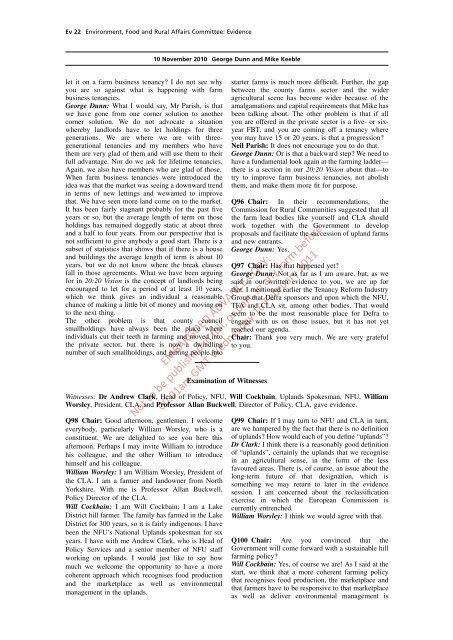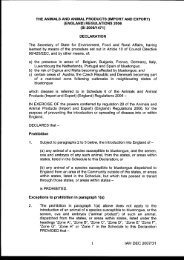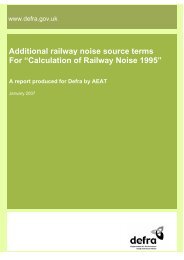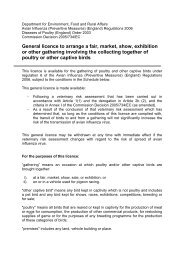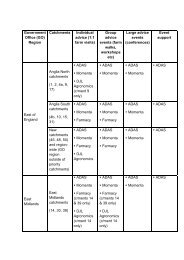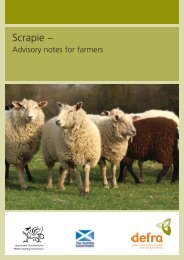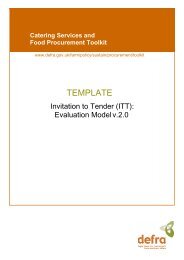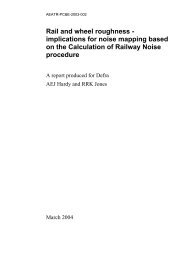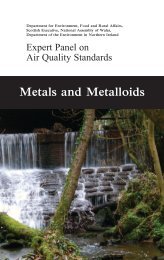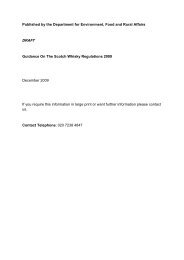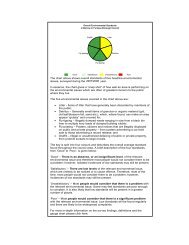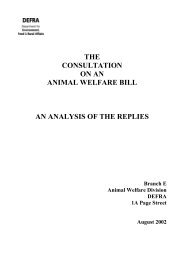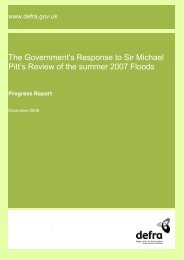Farming in the Uplands - ARCHIVE: Defra
Farming in the Uplands - ARCHIVE: Defra
Farming in the Uplands - ARCHIVE: Defra
You also want an ePaper? Increase the reach of your titles
YUMPU automatically turns print PDFs into web optimized ePapers that Google loves.
Ev 22 Environment, Food and Rural Affairs Committee: Evidence<br />
let it on a farm bus<strong>in</strong>ess tenancy? I do not see why<br />
you are so aga<strong>in</strong>st what is happen<strong>in</strong>g with farm<br />
bus<strong>in</strong>ess tenancies.<br />
George Dunn: What I would say, Mr Parish, is that<br />
we have gone from one corner solution to ano<strong>the</strong>r<br />
corner solution. We do not advocate a situation<br />
whereby landlords have to let hold<strong>in</strong>gs for three<br />
generations. We are where we are with threegenerational<br />
tenancies and my members who have<br />
<strong>the</strong>m are very glad of <strong>the</strong>m and will use <strong>the</strong>m to <strong>the</strong>ir<br />
full advantage. Nor do we ask for lifetime tenancies.<br />
Aga<strong>in</strong>, we also have members who are glad of those.<br />
When farm bus<strong>in</strong>ess tenancies were <strong>in</strong>troduced <strong>the</strong><br />
idea was that <strong>the</strong> market was see<strong>in</strong>g a downward trend<br />
<strong>in</strong> terms of new lett<strong>in</strong>gs and wewanted to improve<br />
that. We have seen more land come on to <strong>the</strong> market.<br />
It has been fairly stagnant probably for <strong>the</strong> past five<br />
years or so, but <strong>the</strong> average length of term on those<br />
hold<strong>in</strong>gs has rema<strong>in</strong>ed doggedly static at about three<br />
and a half to four years. From our perspective that is<br />
not sufficient to give anybody a good start. There is a<br />
subset of statistics that shows that if <strong>the</strong>re is a house<br />
and build<strong>in</strong>gs <strong>the</strong> average length of term is about 10<br />
years, but we do not know where <strong>the</strong> break clauses<br />
fall <strong>in</strong> those agreements. What we have been argu<strong>in</strong>g<br />
for <strong>in</strong> 20:20 Vision is <strong>the</strong> concept of landlords be<strong>in</strong>g<br />
encouraged to let for a period of at least 10 years,<br />
which we th<strong>in</strong>k gives an <strong>in</strong>dividual a reasonable<br />
chance of mak<strong>in</strong>g a little bit of money and mov<strong>in</strong>g on<br />
to <strong>the</strong> next th<strong>in</strong>g.<br />
The o<strong>the</strong>r problem is that county council<br />
smallhold<strong>in</strong>gs have always been <strong>the</strong> place where<br />
<strong>in</strong>dividuals cut <strong>the</strong>ir teeth <strong>in</strong> farm<strong>in</strong>g and moved <strong>in</strong>to<br />
<strong>the</strong> private sector, but <strong>the</strong>re is now a dw<strong>in</strong>dl<strong>in</strong>g<br />
number of such smallhold<strong>in</strong>gs, and gett<strong>in</strong>g people <strong>in</strong>to<br />
10 November 2010 George Dunn and Mike Keeble<br />
Exam<strong>in</strong>ation of Witnesses<br />
Witnesses: Dr Andrew Clark, Head of Policy, NFU, Will Cockba<strong>in</strong>, <strong>Uplands</strong> Spokesman, NFU, William<br />
Worsley, President, CLA, and Professor Allan Buckwell, Director of Policy, CLA, gave evidence.<br />
Q98 Chair: Good afternoon, gentlemen. I welcome<br />
everybody, particularly William Worsley, who is a<br />
constituent. We are delighted to see you here this<br />
afternoon. Perhaps I may <strong>in</strong>vite William to <strong>in</strong>troduce<br />
his colleague, and <strong>the</strong> o<strong>the</strong>r William to <strong>in</strong>troduce<br />
himself and his colleague.<br />
William Worsley: I am William Worsley, President of<br />
<strong>the</strong> CLA. I am a farmer and landowner from North<br />
Yorkshire. With me is Professor Allan Buckwell,<br />
Policy Director of <strong>the</strong> CLA.<br />
Will Cockba<strong>in</strong>: I am Will Cockba<strong>in</strong>; I am a Lake<br />
District hill farmer. The family has farmed <strong>in</strong> <strong>the</strong> Lake<br />
District for 300 years, so it is fairly <strong>in</strong>digenous. I have<br />
been <strong>the</strong> NFU’s National <strong>Uplands</strong> spokesman for six<br />
years. I have with me Andrew Clark, who is Head of<br />
Policy Services and a senior member of NFU staff<br />
work<strong>in</strong>g on uplands. I would just like to say how<br />
much we welcome <strong>the</strong> opportunity to have a more<br />
coherent approach which recognises food production<br />
and <strong>the</strong> marketplace as well as environmental<br />
management <strong>in</strong> <strong>the</strong> uplands.<br />
starter farms is much more difficult. Fur<strong>the</strong>r, <strong>the</strong> gap<br />
between <strong>the</strong> county farms sector and <strong>the</strong> wider<br />
agricultural scene has become wider because of <strong>the</strong><br />
amalgamations and capital requirements that Mike has<br />
been talk<strong>in</strong>g about. The o<strong>the</strong>r problem is that if all<br />
you are offered <strong>in</strong> <strong>the</strong> private sector is a five- or sixyear<br />
FBT, and you are com<strong>in</strong>g off a tenancy where<br />
you may have 15 or 20 years, is that a progression?<br />
Neil Parish: It does not encourage you to do that.<br />
George Dunn: Or is that a backward step? We need to<br />
have a fundamental look aga<strong>in</strong> at <strong>the</strong> farm<strong>in</strong>g ladder—<br />
<strong>the</strong>re is a section <strong>in</strong> our 20:20 Vision about that—to<br />
try to improve farm bus<strong>in</strong>ess tenancies, not abolish<br />
<strong>the</strong>m, and make <strong>the</strong>m more fit for purpose.<br />
Q96 Chair: In <strong>the</strong>ir recommendations, <strong>the</strong><br />
Commission for Rural Communities suggested that all<br />
<strong>the</strong> farm lead bodies like yourself and CLA should<br />
work toge<strong>the</strong>r with <strong>the</strong> Government to develop<br />
proposals and facilitate <strong>the</strong> succession of upland farms<br />
and new entrants.<br />
George Dunn: Yes.<br />
Q97 Chair: Has that happened yet?<br />
George Dunn: Not as far as I am aware, but, as we<br />
said <strong>in</strong> our written evidence to you, we are up for<br />
that. I mentioned earlier <strong>the</strong> Tenancy Reform Industry<br />
Group that <strong>Defra</strong> sponsors and upon which <strong>the</strong> NFU,<br />
TFA and CLA sit, among o<strong>the</strong>r bodies. That would<br />
seem to be <strong>the</strong> most reasonable place for <strong>Defra</strong> to<br />
engage with us on those issues, but it has not yet<br />
reached our agenda.<br />
Chair: Thank you very much. We are very grateful<br />
to you.<br />
EMBARGOED ADVANCE COPY:<br />
Not to be published <strong>in</strong> full, or part, <strong>in</strong> any form before<br />
00.01am GMT Wednesday 16 February 2011<br />
Q99 Chair: If I may turn to NFU and CLA <strong>in</strong> turn,<br />
are we hampered by <strong>the</strong> fact that <strong>the</strong>re is no def<strong>in</strong>ition<br />
of uplands? How would each of you def<strong>in</strong>e “uplands”?<br />
Dr Clark: I th<strong>in</strong>k <strong>the</strong>re is a reasonably good def<strong>in</strong>ition<br />
of “uplands”, certa<strong>in</strong>ly <strong>the</strong> uplands that we recognise<br />
<strong>in</strong> an agricultural sense, <strong>in</strong> <strong>the</strong> form of <strong>the</strong> less<br />
favoured areas. There is, of course, an issue about <strong>the</strong><br />
long-term future of that designation, which is<br />
someth<strong>in</strong>g we may return to later <strong>in</strong> <strong>the</strong> evidence<br />
session. I am concerned about <strong>the</strong> reclassification<br />
exercise <strong>in</strong> which <strong>the</strong> European Commission is<br />
currently entrenched.<br />
William Worsley: I th<strong>in</strong>k we would agree with that.<br />
Q100 Chair: Are you conv<strong>in</strong>ced that <strong>the</strong><br />
Government will come forward with a susta<strong>in</strong>able hill<br />
farm<strong>in</strong>g policy?<br />
Will Cockba<strong>in</strong>: Yes, of course we are! As I said at <strong>the</strong><br />
start, we th<strong>in</strong>k that a more coherent farm<strong>in</strong>g policy<br />
that recognises food production, <strong>the</strong> marketplace and<br />
that farmers have to be responsive to that marketplace<br />
as well as deliver environmental management is


